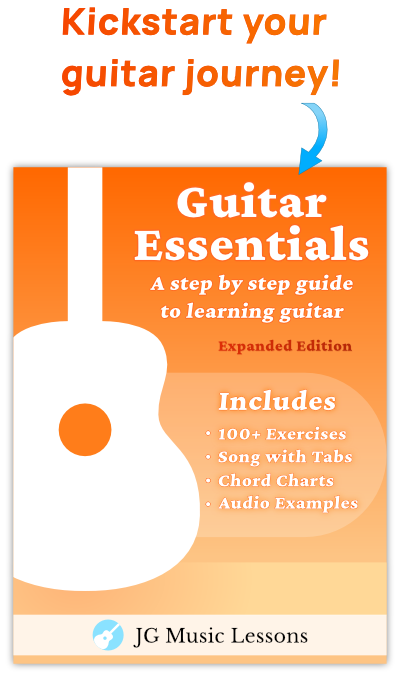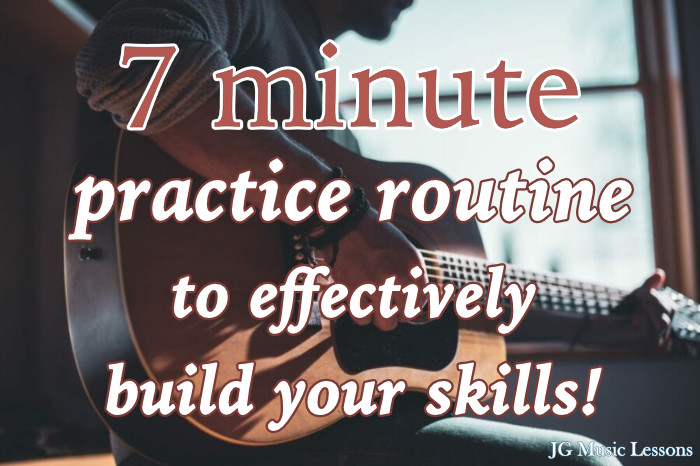Do you want to make progress on your guitar skills but keep putting it off because you don’t know where to start or simply feel overwhelmed? We all have things we want to get better at but let’s face it, we simply have a limited time to invest each day.
In this post, we are going to look at 3 steps to help you get started with a 7 minute guitar practice routine that you can incorporate into your busy day including practical examples by skill level. Let’s get started!
Step 1 – Identify the areas you want to improve in
The first step is to identify the areas you want to improve on. This can look different for each person depending on your ability. This can include learning and reviewing material like scales, chords, strumming/picking patterns, and songs.
We can divide this 7 minute practice into 3 sections like this:
- Technique (chords/scales) – 2 minutes
- Rhythm (strumming/picking patterns) – 2 minutes
- Song – 3 minutes. (This is the section where you put chords/scales and rhythm together).
By clarifying the material you want to improve on, you can maximize the short time you have for a practice session.
Step 2 – Keep track of progress by writing down your practice routine
There is something about writing things down to solidify what you are setting out to do. Whether you want keep a journal or notes on your computer, do whatever works best for you. For example, you can download this free guitar practice guide to help you do that.
Writing things down will give you clarity about what you want to learn or review during your practice sessions so that you are coming in with a strategic plan.
Further in this post, we’ll cover specific material suggestions according to your current skill level that you can use as a guide.
Step 3 – Stick to a practice routine that works for you
Jotting down your practice time will help you to be more consistent once you prioritize it on your schedule. For example, I set a reminder on my phone but you can use whatever works best for you.
Now that you’ve decided on the areas you want to improve in and have written them down, you’ve set yourself up for a brief but effective practice that you can keep more consistently. The hardest part is to start but once you do, you can find yourself in a rhythm that will make you want to keep going.
Guitar practice examples by skill level
Use these examples as a guide and adjust them according to your musical goals.
Beginner level
- Learn/review open chords, power chords, notation symbols
- Learn/review simple strumming patterns (quarter and eighth notes)
- Learn/review songs with open chords, power chords
Advanced beginner level
- Learn/review the notes on the fretboard, barre chords, Major scales, minor scales
- Learn/review strumming patterns with 16th notes
- Learn/review songs with barre chords and song melodies
Intermediate level
- Learn/review pentatonic scales, blues scales, chord inversions, Major triads, minor triads
- Learn/review strumming patterns with muted notes
- Learn/review how to improvise over simple chord progressions
Advanced intermediate level
- Learn/review melodic minor scales, harmonic minor scales, 7th chords, shell chords
- Learn/review picking patterns
- Learn/review songs with 7th chords, shell chords or finger-style arrangements, develop improvisation skills
Advanced level
- Learn/review diminished scales, learn to play in all key signatures, learn to connect a melody and chords
- Learn/review drop 2 chords, learn chords with tensions (9, 11, 13)
- Memorize/review song arrangements and entire solos

4 tips for a more effective guitar practice routine
Here are four tips to help you make the most of your guitar practice time.
1. Remove distractions
Remove whatever might be getting in the way of your practice time whether it’s your phone or tv. If possible, you can also choose to work in a quiet or separate space to maximize your ability to concentrate. Sometimes I like to set a timer to stay focused on a specific topic and to be intentional with the time I’ve set out.
2. Use a metronome
Practicing with a metronome will help you be conscious of keeping good timing when playing. Start out at a slow tempo and gradually build up your speed with good technique and rhythm rather than trying to play too fast with sloppy technique and bad timing.
During practice, you can try pushing your limits with tempo but slow things down again when you see that your timing or technique are not keeping up.
Here’s a free metronome on our site.
3. Adjusting practice time using this format
You may find that by dividing practice into sections, you can be more effective for a limited practice time. However, you can always stretch out this format for however much time you have.
For example, if have 20 minutes to practice, spread out each of the four sections in 5 minute increments. You can even set a timer if that helps you.
It could look something like this:
- 5 min – Review new chords
- 5 min – Review strumming/picking patterns
- 5 min – Review scale patterns/licks/riffs
- 5 min – Review a song of your choice
If you want to extend your practice sessions, you can also add other sections for specific topics you want to improve on. Depending on your skill level, this can include topics like reading notation, learning chord melodies, practicing riffs/melodies, or improvisation.
4. Practice recording yourself
If possible, I recommend learning to record yourself as you practice your instrument. This can give you a better perspective of what you’re sounding like and what you want to develop in your playing.
Also, recording can simply make practicing way more fun and interactive. For more, see these 6 benefits of recording to practice music.
Wrapping up
The interesting thing about this practice routine is that you end up picking up the guitar for longer than you expect. Like I mentioned earlier, you may start with a brief 7 minute practice session in mind but it can easily lead you to an in-depth practice time once you get into the flow.
Instead of delaying the things you want to get better at, you can start changing little habits that create lasting results in your guitar playing.
To recap, here are the steps to start implementing the 7 minute practice routine:
- Identify the areas you want to improve in.
- Keep track of progress by writing down your practice routine.
- Stick to a practice routine that works for you.
Be patient and take it one step at a time. With time and consistency, you will build your guitar skills and get closer to achieving your musical goals. You may also want to check out these 6 tips to improve your guitar playing.
📘 Get the free guitar practice guide here!
Cover photo by Jacek Dylag on Unsplash

